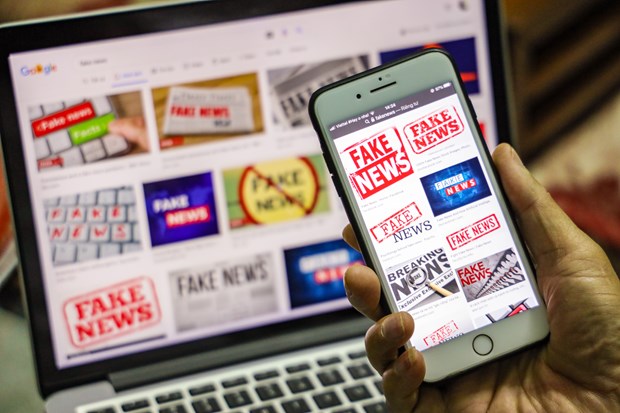.jfif) Opinion
Opinion

Numerous businesses suffer heavy financial losses due to the spread of fake news on social media in the fast-paced digital age we live in. Lê Quốc Minh, member of the Party Central Committee, deputy head of the Party Central Committee’s Commission of Popularisation and Education, editor-in-chief of Nhân dân (the People) newspaper, chairman of Việt Nam Journalists Association, spoke to Vietnam News Agency about the issue.
Numerous businesses suffer heavy financial losses due to the spread of fake news on social media in the fast-paced digital age we live in. Lê Quốc Minh, member of the Party Central Committee, deputy head of the Party Central Committee’s Commission of Popularisation and Education, editor-in-chief of Nhân dân (the People) newspaper, chairman of Việt Nam Journalists Association, spoke to Vietnam News Agency about the issue.

|
| Lê Quốc Minh, a member of the Party Central Committee, deputy head of the Party Central Committee’s Commission of Popularisation and Education, editor-in-chief of Nhân dân (the People) newspaper, chairman of Việt Nam Journalists Association. VNA/VNS Photo |
How do you evaluate the role of mainstream media among many other sources of information that readers can access on social media?
A recent report said that the percentage of users searching for news on social media is higher than those searching on mainstream media, especially young people. Mainstream media such as printed newspapers, television and radio seems to only attract older people.
On the other hand, fake news, negative information and toxic content on social media are increasing with the development of artificial intelligence (AI). It is a concern that the spread of fake news will occur on a much larger scale. So there will be a higher rate of people reading fake news when they go online to seek information. There will be individuals who unintentionally or intentionally disseminate, share or comment on this type of content which can lead to extremely serious consequences.
Mainstream media cannot remain the same. It needs to regain the trust of readers by providing more reliable and official information. It also has to become more present on social media, not only on Facebook and YouTube but also on Zalo, Twitter, TikTok and more.

|
| The development of AI raises concerns that the spread of fake news will occur on a much larger scale. VNA/VNS Photo Minh Sơn |
Do you believe that the collaboration between the media and businesses needs to be strengthened in the context that businesses are currently facing difficulties due to the impact of the pandemic and the global economy?
The relationship between the media and businesses has been a mutually beneficial relationship so far. Even when the Internet and social media were not developed, the media still needed businesses for advertising and financial support. Conversely, businesses also need the media as an official channel to provide accurate information to readers.
There have been numerous conferences and workshops emphasising the role of the media as a bridge connecting businesses with readers and audiences. We have seen the effectiveness of these efforts in recent times. The mindset of a one-way relationship where businesses need the media, but the media may not necessarily need businesses, has been changing.
The connection between media and businesses becomes even more crucial when the media sector becomes more challenging. Print media is experiencing a decline in advertising. Even radio, television and online newspapers are facing a continuous decrease in advertising revenue. Therefore, the media now needs businesses in other ways beyond advertising, such as sponsored content, paid business collaborations and even e-commerce partnerships between the media and businesses. These are popular approaches demonstrating flexibility in the response and cooperation between the media and businesses for mutual support.
More than generating revenue and providing economic support to the media, this collaboration brings reliable and official information to readers. That is the most important point in this relationship.
A transparent and open relationship is needed between the two parties, avoiding only highlighting the positive aspects while concealing difficulties. The more transparent and open the collaboration, the easier it is to coordinate with each other to provide the public with the most accurate information. It can even raise awareness of the challenges that businesses may face.
If the information lacks transparency, there is a possibility that the media might report inaccurately about businesses. Such misinformation on mainstream media can even cause more harm when it spreads. The connection between the media and businesses is hoped to become even closer in the future.
As a chairman of the Việt Nam Journalists Association, what do you think the media needs from businesses and how should the relationship between the media and ministries, local authorities and businesses be maintained and developed in the future?
Not only small and medium-sized enterprises but also large businesses, ministries, and localities still face many difficulties in connecting with the media. We have had numerous training sessions on policy communications but the understanding of the effectiveness of the media and the collaboration with the media at different levels of ministries, local localities and businesses is not yet fully comprehensive.
For small and medium-sized enterprises, it is understandable that they face difficulties in establishing connections with the media. The Việt Nam Journalists Association and the Vietnam Chamber of Commerce and Industry (VCCI) have held many discussions which aim to make further progress and build mechanisms for small businesses to deliver information to the media in the easiest way.
In foreign countries, there are professional media agencies that allow small and medium-sized businesses without dedicated media departments to push press releases and introduce their products to the public. Professional associations in different industries are expected to establish information systems so that the media can easily find the basic information about the business.
Businesses can not only access media but they can also proactively build websites and fan pages to introduce themselves to the public. They can also actively work with public relations companies and key opinion leaders (KOLs) to promote their products and businesses. It is necessary to promote through multiple channels and ensure accurate information dissemination. However, the mainstream media remains the most reliable source of information. Information from elsewhere may not be trusted by readers but if it is reported and evaluated by an official media organisation, its credibility will be significantly higher.
That means the media organisations can build databases of businesses themselves, but the media still need an authoritative information channel created by businesses, associations, departments and local authorities.
Regular updates are also necessary to deliver information from businesses to the media effectively. Both sides need to assist each other rather than adopting a waiting approach: one side waiting for businesses to deliver information, while the other side not knowing how to approach the media.
In the era of rapid development of digital information technology, as it is today, there is no other way but to collaborate and increase proactivity from all parties to ensure information flow and deliver official and reliable information to readers as quickly as possible. – VNS